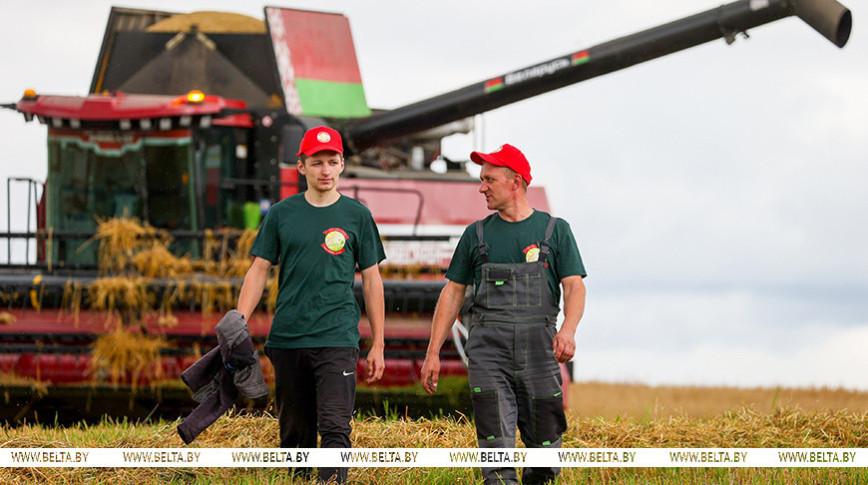- Address:
10 Korotkina Street, Shumilino, Vitebsk Oblast, 211259, Belarus
- Phone:
8 (02130) 4-10-45

Lukashenko: Belarusians have always revered peasants’ hard work
Belarusians have always considered – and continue to consider – the hard work of peasants the most important and sacred on earth, Belarusian President Aleksandr Lukashenko said at a ceremony to present state awards to best-performing agricultural workers on 11 November, BelTA has learned.
“The words ‘bread’ and ‘life’ can safely be equated. Therefore, Belarusians have always considered, and continue to consider, the hard work of peasants the most important and sacred on earth,” the head of state emphasized.
The president noted that over the years of independence, Belarus has succeeded in creating a powerful and highly efficient agro-industrial complex. Today, 212,000 agricultural machines – mostly domestically produced – are in operation in the fields, and nearly 3,000 farms produce milk. The country now boasts 38 large poultry farms, 18 fish farms, 94 pig farms, and 64 large beef production facilities. Furthermore, Belarus mines potash, produces complex fertilizers, and develops veterinary medications, compound feed, and premixes. “But there is still room for improvement,” the Belarusian leader noted.
For the 2025 season, the head of state projected a harvest of grain and legumes to exceed 11 million tonnes, including rapeseed and corn in bunker weight.
“But, as the saying goes, we need not only bread, but also something to go with it,” the president noted. Given the country’s stockpiles of food and feed grains, as well as grass feed, he also projected strong results in livestock farming.
By the end of the year, Belarus is projected to produce over 9 million tonnes of milk. “That’s almost 1,000 liters per capita (958 liters in 2024). A colossal figure,” Aleksandr Lukashenko emphasized. Approximately 70 farms are expected to exceed a dairy herd productivity of 10,000 kg per cow, with five farms yielding over 13,000 kg per head. “This means new dairy peaks lie ahead. Our meat and poultry production is also on the rise,” the head of state added.
In addition, the harvest has yielded more than 5 million tonnes of sugar beets, around 900,000 tonnes of potatoes, and about 600,000 tonnes of vegetables. “The government promises that we will be able to make cabbage soup and borscht from inexpensive and delicious Belarusian beetroots, onions and cabbage. There should be enough for everyone – and there has been for a long time; we just need to manage it properly,” said Aleksandr Lukashenko.
He noted that this year's entire harvest was grown and gathered under extremely challenging weather conditions. “We persevered,” the Belarusian leader stressed. “We fought shoulder to shoulder in this battle for the harvest: we sent combined teams from neighboring regions to the fields, and brought in the military, Emergencies Ministry personnel, and all concerned citizens.” The president recalled that, at his direction, employees from various organizations and enterprises will be recruited to operate expensive domestic equipment during the peak agricultural season.
The president recognized the achievements of record-breaking farms with yields exceeding 100 centners per hectare, as well as 25 districts that achieved a gross grain harvest of over 100,000 tonnes. More than 3,100 combine crews each threshed over 1,000 tonnes of grain. “There were also true champions. On the national podium was one ‘gold’ crew, having threshed over 8,000 tonnes – I remember when I worked [in agriculture], 4,000 tonnes on a farm was a dream, but here one person threshed two harvests of a large farm I once managed. We had seven silver medalists with results exceeding 5,000 tonnes, and nine bronze medalists, with over 4,000 tonnes in their bins,” said Aleksandr Lukashenko.
Many of the harvest’s heroes participated in the ceremony at the Palace of Independence and received well-deserved awards from the head of state.





